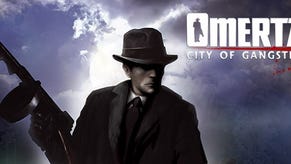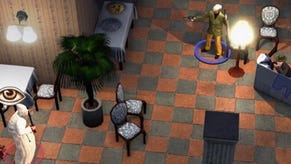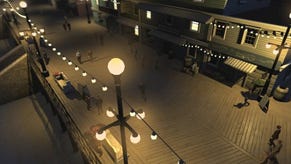First Look: Omerta - City of Gangsters
You in or out?
We sent Rich Stanton in undercover to find out where all those valuable gangster cliches were coming from. This is his report.
What do you think is the most memorable line in gangster movies? Gabriel Dobrev is the CEO of developer Haemimont Games, and giving us a brief spiel before we get a shot on Omerta: City of Gangsters – he plumps for the the opening of Goodfellas. “As far back as I can remember, I've always wanted to be a gangster.”
It's a safe bet, I'd say, even a conservative one. And as Omerta shows, that kind of ambition doesn't get you everything. The screens may make this look like something of an open world, but Omerta's a more enclosed experience. An overworld of residential and business joints, where you balance the books and expand operations, is mixed with small-scale turn-based combat missions. It's an unusual combination, but probably a bit too close to the superlative XCOM for comfort.
The overworld's take on a gangster's financial life has a couple of smart ideas, the best of which is splitting your cash into two piles – 'dirty' and 'clean' money. Being a gangster, a lot of your activities bring in the former, so having a backroom operation that can effectively launder cash is key to expanding a somewhat front behind businesses bought legitimately.

The other resources are beer, liquor and firearms, each of which unlock certain strategic options over other properties. Five firearms will let you do a drive-by on a competitor's business, for example, or ten liquors might be enough to get some information from a loose-tongued informant. Businesses produce these resources, as well as impacting on one another's effectiveness, so you're always annoying or pleasing somebody with any actions.
This side of Omerta quickly runs out of steam. Your actions within the overworld are limited by the amount of gangsters you have (starting with one up to a maximum of six) and, even in the brief couple of hours I spent with the game, too much of it felt like waiting – making decisions then just waiting for cooldowns, tapping your fingers, watching the clock. And this kind of thing is what gets you itching to start a fight.
The link between the overworld and the combat is your gangsters, who are carrying out the overworld actions and levelling up through them. In fights you take in up to four of your mobsters, all of whom will have a different weapon and (on levelling) several abilities. The best thing about Omerta is its weapons, even though they're rather weedy in the effects department. Each has such pronounced differences their wielders are locked into roles, and staggeringly effective in the right scenario. To put it another way, if you're going indoors take a couple of shotguns.

Characters themselves specialise in certain weapons, and there's even a melee class that comes complete with a 'kick to the balls' special move. This weakens the recipient's next attack, and become my go-to opener in all battles. Pistols can be used to gutshot foes for five turns of bleeding, dual revolvers can make enemies 'dance' and lose moves, or Tommy Guns can spray whole areas and scare the other side.
It's usually pretty obvious what you'd ideally be doing in any situation, but Omerta's final little twist is in the order characters move. Each has a stat determining how often they wait between turns, and the overall order's shown at the top of the screen. It basically means that the Big Man (actual name) might be able to walk into a corridor and blast everyone away in one move, but he'll also be stuck there for a good long time.
What's around the weapons and turn-orders are strategy staples, implemented effectively with little fuss; a semi-destructible cover system, hit percentages with too-small number text, movement and action points, familiar stuff. The guns are what makes it feel different, and change-up similar scenarios into new types of battle. One street shootout was a distance affair, won with potshots over multiple turns. Another identical setup had two gangs charging at each other, over more or less instantly.

Despite this solid foundation, however, Omerta doesn't quite hit the heights. The small team sizes make for relatively fast-paced battles, but shonky camera angles and the basic visual effects can also make them drag. It also feels odd that gangsters don't die, instead getting wounded or jailed and sitting out for a while. Feels like quite a low-risk occupation.
The game will also ship with a multiplayer mode, not available in this build, which sounds like it'll be similar to XCOM in operation – building a squad of tweaked presets with limited cash, rather than linking to the singleplayer. There's no point in bludgeoning Omerta with the comparison in other regards, but it does veer uncomfortably close in several.
The biggest problem, however, isn't its competition so much as its inspiration. Omerta at the minute has an unspectacular combat system with good ideas, and an overworld that flatters to deceive. A well-crafted aesthetic could give these two elements a little more life and, looking at a February release, the 1920s American gangster scene feels unconvincing.

Gangsters are about business fronts and shootouts, but there's also a rich foundation to the best mob stories – the personalities and relationships that make everything, then ruin it. My favourite line from Goodfellas is Henry Hill talking over that bucolic jail cell the wiseguys share. “Paulie was doing a year for contempt and had a wonderful system for garlic. He used a razor and sliced it so thin it would liquefy in the pan with a little oil. It's a very good system.”
This is the kind of dialogue you get in Omerta's overworld: “The community is starting to open up to you. Still there's a long way to go before winning the people's trust. Continue being their benefactor and increase your Liked rating to 40. Only then will we consider you as one of us.” The comparison's a little unfair, but the point is: who talks to a mob boss like that? Omerta does have its good sides, grant in terms of its theme, and especially if you always wanted to be a gangster, don't expect Goodfellas.





